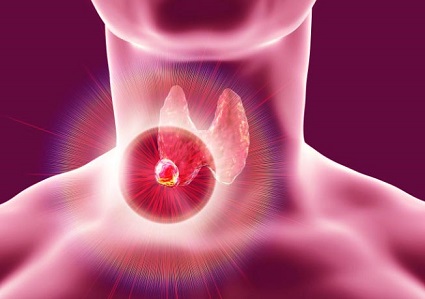Nikhil Prasad Fact checked by:Thailand Medical News Aug 06, 2024 1 year, 4 months, 3 weeks, 13 hours, 47 minutes ago
Herbs And Phytochemicals: Understanding Anaplastic Thyroid Carcinoma
Anaplastic thyroid carcinoma (ATC) is a rare but highly aggressive type of thyroid cancer known for its poor prognosis and high mortality rate. This type of cancer spreads rapidly and is resistant to many traditional treatments. However, a recent study from researchers at the University of Messina and Istituto Oncologico del Mediterraneo-Italy brings new hope with the discovery of the protective role of troxerutin (Trox) in combating ATC. This
Herbs And Phytochemicals news report delves into the study's key findings.
 Troxerutin shows promise in fighting aggressive thyroid cancer
What is Troxerutin?
Troxerutin shows promise in fighting aggressive thyroid cancer
What is Troxerutin?
Troxerutin, also known as Vitamin P4, is a phytochemical belong to the class of bioflavonoids and is found in many fruits and vegetables, such as tea, coffee, and cereals. It is recognized for its vasoprotective, anti-inflammatory, and anti-oxidant properties. Researchers have been exploring its potential in various types of cancer, including liver cancer and non-small cell lung cancer. This study aimed to evaluate the effectiveness of Trox in reducing the progression of ATC.
The Study Design
The research team conducted both in vitro (test tube) and in vivo (live organism) studies. They treated human ATC 8305C cell lines with different concentrations of Trox and observed its effects on cell viability and migration. Additionally, they tested Trox on mice with ATC to confirm the findings from the cell studies.
-In Vitro Findings:
Trox was tested at concentrations of 10, 30, 100, and 300 µg/mL on human thyroid carcinoma cell lines FTC-133, 8305C, and K1.
The MTT assay, a test used to assess cell metabolic activity, showed that Trox significantly reduced the viability of these cancer cells in a concentration-dependent manner.
Higher concentrations of Trox (100 and 300 µg/mL) were particularly effective in reducing the viability and migratory capacity of the 8305C cell line, which represents the most aggressive form of thyroid cancer.
-In Vivo Findings:
Mice with induced ATC were treated with Trox at doses of 12.5, 25, and 50 mg/kg for 14 days.
The treatment led to a significant reduction in tumor growth and morphological alterations in the thyroid tissue.
Histological evaluations revealed a dose-dependent decrease in the accumulation of mast cells and a reduction in the inflammatory response within the thyroid tissue.
Key Mechanisms of Action
The study identified several key mechanisms through which Trox exerts its anti-cancer effects:
-Reduction of Cell Viability and Migration:
Trox treatment decreased the expression of anti-apoptotic factors like B-cell lymphoma 2 (Bcl-2) and increased pro-apoptotic factors su
ch as Caspase-3 and BID.
It also activated oxidative stress mediators, including manganese superoxide dismutase (MnSOD) and heme oxygenase-1 (HO-1), which help in reducing the survival of cancer cells.
-Modulation of NF-κB Pathway:
Trox significantly reduced the expression of nuclear factor kappa-light-chain-enhancer of activated B cells (NF-κB) and increased the expression of inhibitor of kappa B alpha (IκB-α), indicating a reduction in the inflammatory response.
The treatment also lowered the levels of NIK and TRAF6, which are markers involved in the NF-κB pathway and play a role in tumor progression.
-Induction of Apoptosis:
The expression of pro-apoptotic proteins like Caspase-3 and BID increased, while anti-apoptotic protein Bcl-2 decreased in response to Trox treatment.
This shift towards apoptosis (programmed cell death) helps in reducing the number of cancer cells.
-Anti-Oxidant Effects:
Trox increased the levels of glutathione (GSH), an important anti-oxidant, while reducing reactive oxygen species modulator 1 (ROMO-1), which is associated with oxidative stress.
These changes contribute to a less favorable environment for cancer cell survival.
Implications for Treatment
The findings of this study suggest that Trox could be a promising therapeutic agent for treating ATC. By reducing cell viability, inhibiting migration, and promoting apoptosis, Trox targets the cancer cells on multiple fronts. Moreover, its ability to modulate inflammatory and oxidative stress pathways adds to its potential as an effective treatment option.
Conclusion
In conclusion, this research highlights the potential of Troxerutin as a powerful agent against anaplastic thyroid carcinoma. The multi-faceted approach of Trox in targeting cancer cells through reducing inflammation, inducing apoptosis, and enhancing anti-oxidative defenses makes it a promising candidate for further clinical trials.
The study findings were published in the peer-reviewed journal: Biomedicines.
https://www.mdpi.com/2227-9059/12/8/1755
For the latest on
Herbs And Phytochemicals, keep on logging to Thailand Medical News.
Read Also:
https://www.thailandmedical.news/news/uncovering-new-biomarkers-in-thyroid-cancer-a-path-to-better-diagnosis-and-treatment
https://www.thailandmedical.news/news/viral-infections-including-covid-19-and-thyroid-cancer-a-new-threat-emerges
